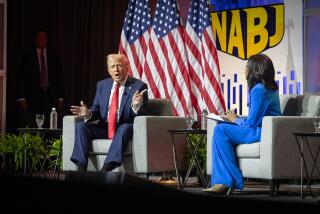Farrakhan’s ‘Bigotry, Anti-Semitism’ Damned by Black Bishop
- Share via
Bishop H. H. Brookins of the African Methodist Episcopal Church, one of the most influential black leaders in California, launched a powerful attack on Nation of Islam leader Louis Farrakhan in a crowded Jewish temple in Los Angeles on Friday night.
“Bigotry, anti-Semitism, racism are abhorrent and must be damned between heaven and hell, whether it comes out of a white mouth or a black mouth, and in this case you are talking about Louis Farrakhan,” said Brookins to loud, prolonged applause. The black community, Brookins said, stands solidly with Jews on this principle “and will fight for that cause.”
Brookins told a capacity crowd of 2,000 in the Stephen S. Wise Temple in Brentwood that he now believes both black and Jewish leaders made mistakes in handling a recent visit by Farrakhan to Los Angeles.
In a speech before 12,500 at the Forum, Farrakhan laced a call for black self-determination and economic separatism with several anti-Jewish statements. He described Israel as a “wicked hypocrisy” and said of the Holocaust: “Don’t push your 6 million down our throats when we lost 100 million (to slavery).”
Although Jewish leaders had pressured black leaders to condemn Farrakhan before his visit, the city’s black leaders, including Brookins and Mayor Tom Bradley, remained silent until after Farrakhan’s speech, Brookins said, because they felt this might diffuse any potential tension.
The Jewish judgment of the situation “might well have been the better judgment,” said Brookins, who has aided the careers of several black politicians, including Bradley. “But at that moment, we felt that our methods would get better results, namely that he would come quietly and go quietly as he had done so many times before. It didn’t turn out that way.” Brookins was for many years a leader of the A.M.E. church in Los Angeles and is now assigned to Little Rock, Ark., although he spends much of his time in Los Angeles.
Brookins debated the results of Farrakhan’s visit with the temple’s senior rabbi, Isaiah Zeldin, at the end of the Friday evening service. Despite his long experience in politics, Brookins at times betrayed nervousness. At one point he said that as he mounted the platform to speak, he felt as though he were climbing to the gallows. Not only was Brookins out of his own church, but he was facing a congregation angry and frustrated with his political stance. And he was close to being the only black face in the crowded temple.
Brookins told reporters later that if he could go back to the days before Farrakhan arrived, he would change his strategy in dealing with the visit, “making our position known in advance” instead of remaining silent until Farrakhan had made his speech.
Zeldin told reporters after the debate that Jews, who were loudly critical of the mayor at the time, were still not satisfied with Bradley’s role in the Farrakhan affair. If Bradley did not at some stage make a stronger statement on Farrakhan and if he did not “make amends to the Jewish community,” which had supported him for many years, Zeldin said, “he doesn’t have a chance of being the governor of this state.”
During their debate, Brookins described Farrakhan’s visit to Los Angeles as “not a good thing for this city.” The black community, he said, “handled it poorly. I think the Jewish community reacted poorly.”
“We disagree on the handling of the affair,” Brookins said, “but we do not disagree on the fact that he (Farrakhan) is anti-Semitic, that he has made devastating remarks . . . pregnant with anti-Semitism, with racism and with the things that we stand against.”
But, he said, whatever happened on the Farrakhan issue “damaging and evil though it may be,” the Jewish and black communities must regain and rebuild the relationship that has existed for so many years “because the two minorities need each other in this country.”
Leaders of both communities, he said, should concentrate on “what we’re gonna do to put this Humpty Dumpty back on the wall.”
Brookins said that despite Farrakhan’s “rantings and ravings about anti-Semitism,” there was a clear reason why Farrakhan’s statements on economic help for black people created an audience for him.
Blacks, Brookins said, “are a drowning people, going down to the watery grave of poverty and unemployment, and here comes a voice loud, clear, charismatic, who says there is hope and there is help for you.”
Zeldin said that two weeks after Farrakhan’s visit “the Jewish community is still bristling with disappointment at the black leadership’s silence.”
Bradley, Zeldin said, had been damaged because he did not speak out until after Farrakhan’s speech. For Bradley to say later that he condemned Farrakhan’s “undercurrent of anti-Semitism is not quite sufficient,” Zeldin said. “There were more than undercurrents. There was blatant anti-Semitism.”
Zeldin said that perhaps Farrakhan’s visit had been a lesson for black leaders. “An anti-Semite is an anti-Semite no matter what you do,” he said. “Have you ever been able to change a Ku Klux Klanner? The only way you can deal with an individual of that sort is to expose him. You can’t deny him freedom of speech, but certainly you can make the entire community aware of the danger that he spews forth.”
More to Read
Sign up for Essential California
The most important California stories and recommendations in your inbox every morning.
You may occasionally receive promotional content from the Los Angeles Times.













